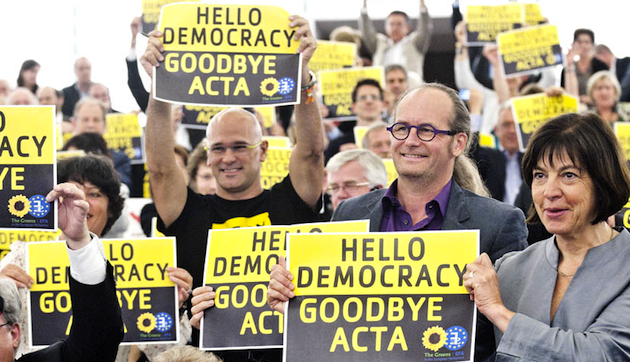Victory For The Open Web: Europe Rejects ACTA
July 04, 2012
on
on

Today, the European Parliament rejected ACTA with an overwhelming majority: 478 MEPs voted against and just 39 in favor, 165 abstained.
David Martin rapporteur of the INTA (International Trade) Committee and outspoken opponent of Anti Counterfeiting Trade Agreement held a short speech before the vote:
After the vote had been casted MEPs held up posters saying: Hello Democracy Goodbye Acta.
The European Commission -the indirectly chosen executive body of the EU- is a fierce proponent of signing the international treaty and has put severe political pressure on the Parliament to vote in favor. The nay-vote is considered a coming-of-age for the Parliament which has been accused in the past of lap-dogish tendencies toward the Commission. In their vote against ACTA they have clearly chosen to listen to the voice of hundreds of thousands of EU citizens who have been protesting against the bill since February over the political games of the Commission.
After the vote had been cast, the floor was given to Maroš Šefčovič, Vice President of the Commission. He echoed earlier statements of Commissioner De Gucht, saying that the Commission would maintain its course. That is to say: the Commission has referred ACTA to the European Course of Justice for an opinion on whether ACTA is compatible with the Charter of fundamental rights of the EU. When it did so it had requested the Parliament to postpone the vote until the Court had come up with an answer. This was expected to take 18 to 24 months and was generally considered a delaying tactic in the hope citizen uprising against ACTA would have had died out by then.
So basically Šefčovič told the Parliament that the Commission is not going to respect the decision it made today.
However, the eurozone crisis is laying bare the major democratic deficit of the EU project. It is unlikely that two years from now the Commission can afford to blatantly ignore the directly elected Parliament. Also, to my knowledge, ACTA is the first issue for which citizens (not interest groups, they've been doing it for a while already) from different member states reached across borders to unite and fight against impending European legislation. The rise of a civil society on an European level. Therefore the defeat of ACTA is not only a victory for the open web but also for a more democratic Europe. The Commission can ignore that but only at a very high cost.
Via: B2fxxx.blogspot.co.uk
David Martin rapporteur of the INTA (International Trade) Committee and outspoken opponent of Anti Counterfeiting Trade Agreement held a short speech before the vote:
"ACTA has been rejected by 5 parliamentary commitees. It has been killed off so many times that it now only exists thanks to the EPP life support machine. No emergency surgery, no transplant, no large period of recuperation is going to save ACTA. It's time to give it its last rites. Time to allow its friends to mourn and for the rest of us to get on with our lives. Thank you Mr President."
After the vote had been casted MEPs held up posters saying: Hello Democracy Goodbye Acta.
The European Commission -the indirectly chosen executive body of the EU- is a fierce proponent of signing the international treaty and has put severe political pressure on the Parliament to vote in favor. The nay-vote is considered a coming-of-age for the Parliament which has been accused in the past of lap-dogish tendencies toward the Commission. In their vote against ACTA they have clearly chosen to listen to the voice of hundreds of thousands of EU citizens who have been protesting against the bill since February over the political games of the Commission.
After the vote had been cast, the floor was given to Maroš Šefčovič, Vice President of the Commission. He echoed earlier statements of Commissioner De Gucht, saying that the Commission would maintain its course. That is to say: the Commission has referred ACTA to the European Course of Justice for an opinion on whether ACTA is compatible with the Charter of fundamental rights of the EU. When it did so it had requested the Parliament to postpone the vote until the Court had come up with an answer. This was expected to take 18 to 24 months and was generally considered a delaying tactic in the hope citizen uprising against ACTA would have had died out by then.
So basically Šefčovič told the Parliament that the Commission is not going to respect the decision it made today.
However, the eurozone crisis is laying bare the major democratic deficit of the EU project. It is unlikely that two years from now the Commission can afford to blatantly ignore the directly elected Parliament. Also, to my knowledge, ACTA is the first issue for which citizens (not interest groups, they've been doing it for a while already) from different member states reached across borders to unite and fight against impending European legislation. The rise of a civil society on an European level. Therefore the defeat of ACTA is not only a victory for the open web but also for a more democratic Europe. The Commission can ignore that but only at a very high cost.
Via: B2fxxx.blogspot.co.uk
Read full article
Hide full article


Discussion (0 comments)